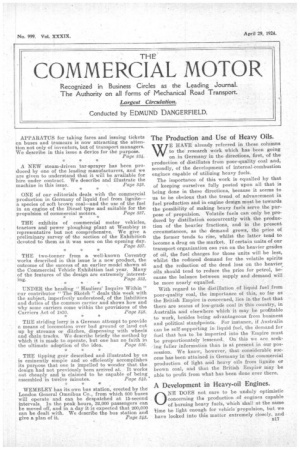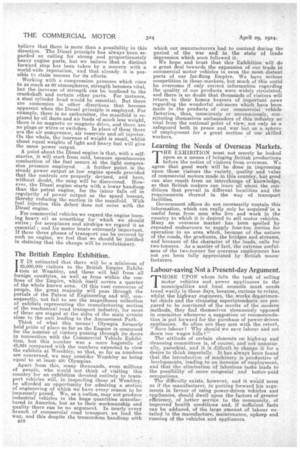The Production and Use of Heavy Oils.
Page 1

Page 2

If you've noticed an error in this article please click here to report it so we can fix it.
E HAVE already referred in these columns to the research work which has been going on in Germany in the directions, first, of the production of distillates from poor-quality coal and, secondly, of the development of internal-combustion engines capable of utilizing heavy fuels.
The importance of this work is equalled by that of keeping ourselves fully posted upon all that is being done in these directions, because it seems to us to be obvious that the trend of advancement in fuel production and in engine design must be towards the possibility of making heavy fuels serve the purpose of propulsion. Volatile fuels can only be produced by distillation concurrently with the production of the heavier fractions, and in the present circumstances, as the demand grows, the price of the former tends to rise, whilst the latter tend to become a drug on the market. If certain units of our transport organization can run on the heavier grades of oil, the fuel charges for those units will be less, whilst the redueed demand for the volatile spirits and the reduction of the dead loss on the heavier oils should tend to reduce the price for petrol, because the balance between supply and ..demand will be more nearly equalled.
With regard to the distillation of liquid fuel from poor-quality coal, the importance of this, so far as the British Empire is concerned, lies in the fact that there are seams of low-grade coal in this country, in Australia and elsewhere which it may be profitable to work, besides being advantageous from business and political standpoints. . For instance, if Australia can be self-supporting in liquid fuel, the demand for fuel that has to be imported into the 'Empire must be proportionately lessened.. On this we are seeking fuller information than is at present in our possession. We know, however, that considerable success has been attained in Germany in the commercial production of light and heavy oils from lignite or brown coal, and that the British Empire' may be able to profit from what has been done over there.
0 A Development in Heavy-oil Engines. NE DOES not care to be unduly optimistic concerning the production of engines capable of burning heavy fuels, which shall at the same time be light enough for vehicle propulsion, but we have looked into this matter extremely closely, and believe that there is more than a possibility in this direction. The Diesel principle has always been Negarded as calling for strong and proportionately heavy engine parts, but we believe that a distinct forward step has been taken by a concern with a world-wide reputation, and that already it is possible to claim success for its efforts.
Working with a compression pressure which rises to as much as 60 atmospheres, strength becomes vital, but the increase of strength can be confined to the crankshaft and certain other parts. For instance, a steel cylinder head would be essential. But there are economies in other directions that become apparent when the Diesel principle is employed. For example, there is no carburetter, the manifold is replaced by oil duets and air feeds of much less weight, there is no magneto or magneto drive, and there are no plugs or wires or switches. In place of these there are the air compressor, air reservoir and oil injector. On the whole, the increase of weight is small, whilst about equal weights of light and heavy fuel will give the same power output.
A point about the Diesel engine is that, with a selfstarter, it will, start from cold, because spontaneous combustion of the fuel occurs at the light compres sion pressure employed. A further point is the steady power output at low engine speeds provided that the controls are properly devised, and here, without doubt, the snag will be discovered. However, the Diesel engine starts with a lower handicap than the petrol engine, for the latter falls off in regularity of power output as the speed lessens, thereby reducing they suction in the manifold. With fuel injection this defect does not occur with the Diesel engine.
For commercial vehicles we regard the engine burning heavy oil as something for which we should strive ; for aeroplanes and airships we regard it as essential ; and for motor boats extremely important. If these three phases of transport can be covered by such an engine, we feel that we should be justified in claiming that the change will be revolutionary.
The British Empire Exhibition.
I
, T IS estimated that there will be a minimum of 25,000,000 visitors to the British Empire Exhibi tion at Wembley, and these will hail from all foreign countries, as well as from within the confines of the Empire, which itself covers, a quarter of the whole known area. Of this vast concourse of people, the great majority will pass through the portals of the Palace . of Engineering and will, consequently, not fail to see the magnificent collection of exhibits representing the manufacturing section of the mechanical road transport industry, for most of these are staged at the sides of the main avenue close to the exit leading to the Amusement Park. Think of what this means! Olympia formerly held pride of place so far as the Empire is concerned for the number of visitors passing through its doors in connection with the Commercial Vehicle Exhibition, but this number was a mere bagatelle, of 43,924 compared with the numbers expected to view the exhibits at Wembley, so that, so far as numbers are concerned, we may consider Wembley as being equal to at least' 400 Olympias.
Apart from this, many thousands, even millions of people, who would not think of visiting this country for an exhibition devoted entirely to transport vehicles will, in inspecting those at Wembley, be afforded an opportunity for admiring a section of engineering of which we have every reason to be immensely proud. We, as a nation, may not produce industrial vehicles in the huge quantities manufactured in America, but as to their workmanship and quality there can be no argument. In nearly every branch of commercial road transport we lead the way, and this despite the tremendous handicap with 1318 which our manufacturers had to contend during the periodof the war and in the state of trade depression which soon followed it.
We hope and trust that this Exhibition will do a great deal towards the expansion of our trade in commercial motor vehicles in even the most distant parts of our far-flung Empire. We have serious competition in those markets, but much of -this could be overcome if only correct information regarding the quality of our products were widely circulated, and there is no doubt that thousands of visitors will return to their homes bearers of important news regarding the wonderful advances which have been made in the products of our commercial vehicle factories' thus, consciously or unconsciously, constituting themselves ambassadors of this industry so vital from the national point of view, not only as a safeguard both in peace and war but as a sphere of employment for a great section of our skilled workers.
Learning the Needs of Overseas Markets.
THE EXHIBITION must not merely be looked upon as a means of bringing British productions before the notice of visitors from overseas. We agree that good work will be done in impressing upon those visitors the variety, quality and value of commercial motors made in this country, but good can also result from an interchange of knowledge, so that British makers can learn all about the conditions that prevail in different localities and the requirements thereof in the way of transport facilities.
Government offices do not necessarily contain this information, which can really only be acquired'in a useful form from men who live and work in the country to which it is desired to sell motor vehicles. Many an overseas market has been spoiled by repeated endeavours to supply four-ton lorries for operation in an area which, because of the natureof the roads, the gradients, the bridges and streams, and because of the character of the loads, calls for two-tonners. As a matter of fact, the extreme usefulness of the two-tonner for overseas employment has not yet been fully appreciated by British maimfacturers.
Labour-saving Not a Present-day Argument. THOSE UPON whom falls the task of selling motor vehicles and power appliances to the municipalities and local councils must needs tread warily in these days, because, curious to relate, whilst the highway engineers, the works departmental chiefs and the cleansing superintendents are prepared to be convinced of the merits of the modern methods, they find themselves strenuously opposed in committee whenever a suggestion or recommendation is put forward for the purchase of power-driven appliances. So often are they met with the retort, "Save labour? Why should we save labour and cut down our wages bills I" The attitude of certain elements on highway and cleansing committees is, of course' and not unnaturally, parochial, and it is difficult to change it for a desire to think imperially. It has always been found that the introduction of machinery is productive of levelopments, leading to an increase of employment, and that the elimination of laborious tasks leads to the possibility of more congenial and better-paid occupations.
The difficulty exists, however, and it woUld seem. as if the manufacturer, in putting forward his arguments in favour of using power-driven vehicles and sppliances, should dwell upon the factors of greater efficiency, of better service to the community, of improved health conditions and, if sufficient facts can be adduced, of the large amount of labour entailed in the manufacture, maintenance, upkeep and running of the vehicles, and appliances.






























